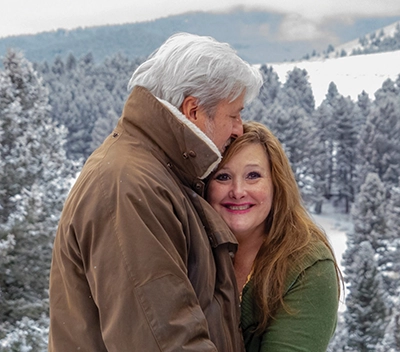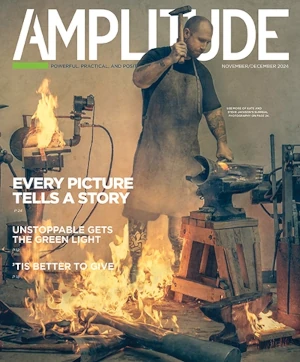
Photo by Grayson Rosenberger
“I can’t tell you how to take care of your loved one,” says author Peter Rosenberger. “What I can do is speak to you in fluent caregiver.”
Rosenberger has learned that language over 40 years of supporting his wife, Gracie, a bilateral lower-limb amputee. He’s shared it with thousands of other caregivers through four books, a popular weekly podcast, and a CD titled Songs for the Caregiver.
Rosenberger’s brand-new book, A Minute for Caregivers, is written in what might be termed “conversational caregiver”—short, accessible chapters with practical words to help you navigate everyday caregiving situations. Per the book’s title, you can read each chapter in 60 seconds. “I’ve timed every one,” Rosenberger says. The minute-by-minute structure isn’t just a gimmick, he adds. It’s woven into the experience of caregiving.
Here are highlights from our recent conversation with the author:
You’ve written about caregiving from many different angles. What spurred this new approach?
I understand my fellow caregivers, and they don’t need somebody to tell them how to give care. When you’re a caregiver, things come at you at warp speed. You need to be able to quickly calm yourself down so you can make good decisions. We’re always dealing with right now—what’s the next thing I need to do? You can’t worry bout a five-year plan. You always just have to deal with today. That’s what it’s all about. It’s just dealing with right now. We’re constantly reacting and not responding. We need a way to catch our breath and settle ourselves down so we can make better decisions. Healthy caregivers make better caregivers.
Have you gotten that sort of feedback from readers and podcast listeners?
The feedback I got from my first book, Hope for the Caregiver, was that the chapters are easy to read. People just do not have the bandwidth to get into a lot of nuts and bolts. They don’t need “follow these six steps to be a better caregiver.” They need something that’s going to help right now. This is a book you can carry with you. You can read it while you’re sitting there at the hospital, while they’re doing physical therapy, while you’re at the rehab center. You can just pick it up, wherever you are, and there’s something there that’s going to help you right now.
And the book’s not full of platitudes, either. One of the things I hate is when people come up to me say, “Don’t forget to take care of yourself.” Thank you, Captain Obvious.
What are some common things people need immediate help with?
Resentment is a big one. They resent the person they’re caring for. They resent family and friends who don’t help the way they want them to. They resent God. They resent doctors, who sometimes think that they’re God. They resent themselves. But you can’t push a wheelchair with clenched fists. We have to open up our hands and let go of things we can’t control. It takes an enormous amount of energy to stay agitated and resentful and furious all the time. The goal is not to have everything the way we want it. The goal is to learn to live peacefully with whatever comes.
Gracie is a bilateral amputee, and she’s gonna fall sometimes. There’s only so much I can do to prevent that. We spend so much energy as caregivers trying to control everything, because lack of control makes us afraid. But I don’t have the kind of bandwidth to fight every single battle. What caregivers need is assurance that we’re gonna get through this. Sometimes it’s gonna suck, but I’m not going to run. I cannot run from the suck fast enough. I can’t run from the heartache. Sometimes I have to turn into it and embrace it for what it is. That’s an old military saying: Embrace the suck. I don’t mean to be vulgar, but there’s a reason that phrase has caught on, and that’s because it really applies in certain situations.
Guilt is another one. There’s no problem so bad that guilt can’t make worse. I stole that quote from Calvin and Hobbes, which I love. Every caregiver I’ve ever met struggles with guilt. And not just guilt over massive mistakes or moral failures. I’m talking about guilt over the fact that I can stand in the shower and Gracie can’t. The guilt of wanting to sit down and take a break, or of actually doing it. Some parents feel guilty for bringing a child into the world with a disability. There are people who feel guilty if they snap at a loved one. There’s a lengthy list of things to feel guilt about.
I sprained my ankle the other day, and I had to take care of it. I had to get off my feet and prop it up. Now, I could feel like I’m being selfish, because Gracie doesn’t have any feet, right? But my feet are the only ones she can count on. So if I let a sore ankle go untreated, I am not being a good caregiver for Gracie. I’m not being a good steward of the person who takes care of Gracie. She knows it’s important that I prop that foot up and let it heal so I can better care for her. But if I let guilt take over, and I don’t take care of myself, and I try to tough it out—how does that help Gracie? How do I help her by being broken myself?
How do you address those issues in your own life?
One of the things I’ve come to understand is that I need grace in my life so much, I married a woman named Grace. And I need not only to receive grace, I need to extend it to others. I can’t extend it until I learn to receive it, and operate in it, and give myself grace. What does that look like? It begins with recognizing that you’re in an impossible situation. I don’t need to put an unrealistic expectation on myself, nor allow others to put it on me. We are not called to be perfect caregivers. I’m going to make mistakes. I’m going to get things wrong.
My advice to my fellow caregivers—and to myself, because I need constant reminders—is that it’s not about happiness. It’s about healthiness. We spend so much energy trying to chase happiness. I’m not looking for happiness; I’m looking for healthiness. Healthy caregivers make for better caregivers. And in that process, happiness does chase us down.
Sample Chapter: Avoid Living in the Wreckage of our Future
Over my wife’s thirty-plus years as an amputee, we’ve learned astonishing things about the human body, including phantom limb pain. Amputees can often feel the sensations and pain of a limb long since removed.
In what might be described as “reverse phantom limb pain,” caregivers often feel anguish over things that haven’t even occurred. Caregiving stress is hard enough without us adding to it by living in the wreckage of our future. Letting our imaginations run wild with all sorts of things that may happen wreaks havoc on us—and keep us in a constant state of agitation.
Each day often brings circumstances that tempt us to act out of fear and its frequent companion: rage. But we are not doomed to those behaviors. Each day can also offer the opportunity to respond rather than react.
My martial arts instructor often shared in training seminars, “Fight what’s closest—not what’s beyond our reach.” It’s a waste of time and resources to focus on battles that don’t exist, particularly when plenty of challenges daily stare us in the face.
Sample Chapter: The Opinions of Others
In 1986, my wife (then fiancé) underwent surgery on her right ankle to save her crushed leg. Although she ultimately lost both legs years later, hope remained in the driver’s seat at the time. While this surgery was her 22nd (best count) since her 1983 car accident, it was my first with her. Following the operation, the surgeon provided a favorable report, and everyone expressed relief. Stating she’d be in recovery for some time, he suggested, “You can’t see her for a while, so why don’t you take a break.”
Following “doctor’s orders,” I went to a movie.
I later learned of the clutched pearls and tongue clucking that occurred while I sat in the theater. One of them, a holy-roller type with a “My Other Car Is a Chariot of Fire” bumper sticker on her Cadillac, piled onto Gracie’s family about my inability to care for her.
Stunned at the response, I mistakenly allowed shame and fear of disapproval to drive future actions. That unfortunate pattern continued for years before learning to trust my instincts. I also better learned how to handled unsolicited opinions flung by the ill-informed and inexperienced.
Trusting in our instincts while detaching from others’ disapproval helps avoid resentment while allowing clarity of thought—and caregivers desperately need to think clearly. It’s okay to watch a movie, go for a drive, take a walk, and by all means, keep firm boundaries with the “pearl clutchers!”
Sample Chapter: Quieten the Room
“We’ve done everything possible to save this leg, all that’s left is amputation. When you’re ready, we’ll have that conversation.”
Those words came from Gracie’s surgeon, following numerous operations to save her right leg—crushed and disfigured in her 1983 car accident. Everyone in Gracie’s life, including me, had an opinion about this—and Gracie understandably struggled mightily during this time. At twenty-five, with a toddler, the decision weighed heavily on her young heart.
Setting an appointment with our pastor, Bob, she limped into his office on her mangled right foot. As she sat quietly in his study, he stated, “Gracie, this room is off-limits to every other voice telling you what to do. My job is to help quieten the noise so you can hear your heart—and God’s leading.”
Gracie pondered for more than an hour while Pastor Bob sat at his desk. No words passed between them. Finally, Gracie looked up with tear-filled eyes and said, “I’m terrified of doing this,” she whispered. Gaining strength, she continued, “But I can’t live this way any longer—it’s got to come off.”
Nodding somberly, he assured Gracie he’d be with her through the ordeal—and he kept his word.
Sometimes the greatest gift we can give to others struggling with heartbreaking decisions is to clear the room, quieten the noise, and sit with them. Most know what needs to be done, but need a quiet place to process the fear and heartache—while assured that they’re not alone.





